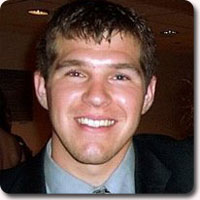 W. Christopher Stewart is a philosophy professor at Houghton College in Houghton, NY, where he teaches courses on aesthetics, the history of philosophy, Nietzsche, Kierkegaard, philosophy of science, and business ethics. He is the author of, among other things, an essay on magic and technology forthcoming in The Hobbit and Philosophy,and earlier co-authored an essay on magic, science, and the ethics of technology for Harry Potter and Philosophy. He has served as a consultant for Pfizer, where he advised a team of marketing experts on the relationship between clinical research, consumer behavior, and Pascal’s wager.
W. Christopher Stewart is a philosophy professor at Houghton College in Houghton, NY, where he teaches courses on aesthetics, the history of philosophy, Nietzsche, Kierkegaard, philosophy of science, and business ethics. He is the author of, among other things, an essay on magic and technology forthcoming in The Hobbit and Philosophy,and earlier co-authored an essay on magic, science, and the ethics of technology for Harry Potter and Philosophy. He has served as a consultant for Pfizer, where he advised a team of marketing experts on the relationship between clinical research, consumer behavior, and Pascal’s wager.
TILE: What exactly is philosophy?
Chris: Philosophy explores fundamental assumptions about the world and what it means to be a human being. Alasdair MacIntyre (a philosopher from the University of Notre Dame) called it “the discipline in which you learn to think about what you’re doing in other disciplines.” I like that because it highlights the fact that philosophers are interested in everything, but at a very deep level. They’re interested in the underlying assumptions that inform other activities and disciplines, from science to business to sports to anything else you can imagine.
TILE: We can’t all be Aristotle. Philosophy, like finance, often scares people away. Is it even possible for the average person to philosophize like a pro?
Chris: Aristotle himself said that philosophy begins with wonder. We look around and see the way things are, and then begin to ask questions.
Philosophizing is a natural human response to experience. The evidence for that is the most common question on the lips of every small child: “Why?” Somewhere along the way, many of us lose our natural sense of wonder, and philosophizing starts to seem like something unfamiliar or strange.
Also, philosophizing isn’t just about expressing opinions, which is the easy part. It’s knowing why we believe what we believe, and being able to provide reasons to anyone who asks us for them.
That’s not easy, but anyone can do it. Just keep asking “Why?”
TILE: What’s one of your top takeaways from a favorite philosopher?
Chris: Plato said that, although mandatory physical exercise does no harm to the body, mandatory learning “never sticks to the mind.” I’ve thought about that quite a bit as a teacher, but I think it applies pretty well in any context. Any time you’re doing something simply because you think you have to, not because you want to, it’s probably not doing anyone much good, including yourself.
TILE: What’s the best advice you would give to your teenage self?
Chris: Be yourself. It sounds trite, but I really do think the impulse to conform to what everyone else is doing limits your potential. Socrates was big on “the examined life.” (Read Plato’s “Apology” to see Socrates in action.) So don’t just run with the pack. Constantly ask yourself “Why am I doing this? Where is it leading me?”
>> TILE brings you exclusive opinions, explanations, and interviews from experts in every industry. To read more, click on Ask the Experts in the TILE Library.
Have a burning question or an expert you’d like to see interviewed? Just Ask TILE!

 W. Christopher Stewart is a philosophy professor at Houghton College in Houghton, NY, where he teaches courses on aesthetics, the history of philosophy, Nietzsche, Kierkegaard, philosophy of science, and business ethics. He is the author of, among other things, an essay on magic and technology forthcoming in The Hobbit and Philosophy,and earlier co-authored an essay on magic, science, and the ethics of technology for Harry Potter and Philosophy. He has served as a consultant for Pfizer, where he advised a team of marketing experts on the relationship between clinical research, consumer behavior, and
W. Christopher Stewart is a philosophy professor at Houghton College in Houghton, NY, where he teaches courses on aesthetics, the history of philosophy, Nietzsche, Kierkegaard, philosophy of science, and business ethics. He is the author of, among other things, an essay on magic and technology forthcoming in The Hobbit and Philosophy,and earlier co-authored an essay on magic, science, and the ethics of technology for Harry Potter and Philosophy. He has served as a consultant for Pfizer, where he advised a team of marketing experts on the relationship between clinical research, consumer behavior, and 


 Pamela Vail is a performer, choreographer, improviser and teacher. She is an Assistant Professor of Dance at Franklin & Marshall College, and also performs with several professional dance companies and creates her own choreography. To sample some of her work, visit
Pamela Vail is a performer, choreographer, improviser and teacher. She is an Assistant Professor of Dance at Franklin & Marshall College, and also performs with several professional dance companies and creates her own choreography. To sample some of her work, visit  Evan Piekara is an alumnus of Teach For America, a national organization that works to ensure educational opportunities for students of all backgrounds. During his 4 years as a corps member, he taught 6th and 7th grade in the South Bronx. He’s also worked as an Institute Staff Member, helping to train the 2008 and 2009 corps. As a result of his classroom experiences, he developed some interesting views on education in America and the importance of gaining financial understanding at a young age.
Evan Piekara is an alumnus of Teach For America, a national organization that works to ensure educational opportunities for students of all backgrounds. During his 4 years as a corps member, he taught 6th and 7th grade in the South Bronx. He’s also worked as an Institute Staff Member, helping to train the 2008 and 2009 corps. As a result of his classroom experiences, he developed some interesting views on education in America and the importance of gaining financial understanding at a young age.